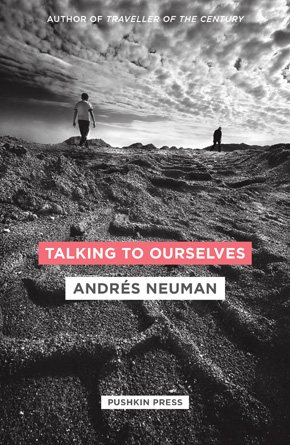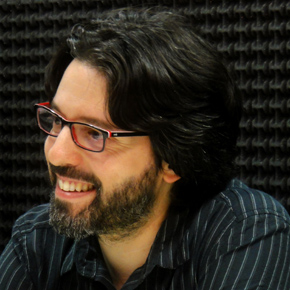In living memory
by Andrés NeumanElena
When someone you slept with dies, you begin to doubt their body and yours. The once touched body withdraws from the hypothesis of a re-encounter, it becomes unverifiable, may not have existed. Your own body loses substance. Your muscles fill with vapour, they don’t know what it was they were clutching. When someone with whom you have slept dies, you never sleep in the same way again. Your body doesn’t let itself go when it is in bed, your arms and legs open as though clinging to the rim of a well, trying not to fall in. It insists on waking up earlier, on making sure at least it possesses itself. When someone with whom you have slept dies, the caresses you gave their skin change direction, they go from relived presence to posthumous experience. There is a hint of salvation and a hint of violation about imagining that skin now. A posteriori necrophilia. The beauty that was once with us remains stuck to us. As does its fear. Its hurt.
Mario
When you reach my age, more or less, perhaps you’ll start to feel protective, and you’re not going to have a father to look after, there’ll be no father to enable you to be that son, I’ll be a lost opportunity, and so now, well, now comes the advice, I feel a bit ridiculous, the ideal thing would be for you to observe me half your life and think: all right, let’s salvage this and this from the misguided man who is my father, and let the devil take the rest, too bad, we can’t, we can’t.
Enjoy life, do you hear?, it’s hard work enjoying life, and have patience, not too much, and look after yourself as if you knew you won’t always be young, even though you won’t know it and that’s okay, and have plenty of sex, son, do it for your sake and mine and even your mother’s, lots of sex, and if you have children, have them late, and go to the beach in winter, in winter it’s better, you’ll see, my head hurts yet I feel good, it’s hard to explain, and go travelling on your own once in a while, and try not to fall in love all the time, and care about your looks, do you hear me?, men who don’t care about their looks are afraid of being queer, and if you are queer, be a man, in short, advice isn’t much use, if you disagree with it you don’t listen, and if you already agree you don’t need it, never trust advice, son, travel agents advise you to go places they’ve never been, you’ll love me more when you’re old, I thought of my father the moment we got down from the truck, our true love for our parents is posthumous, forgive me for that, I’m already proud of the things you’re going to do, I love the way you count the time on your fingers when you set the alarm clock, or do you think I don’t see?, you do it secretly, under the covers, so I won’t know you have difficulty working it out, I’m going to ask you a favour, whatever happens, whatever age you are, don’t stop counting the time on your fingers, promise me, octopus.
Elena
Can ashes belong to someone? And, more importantly, are ashes someone?
His half ashes, to be precise: half for me, the other half for his brothers. They wanted to plant a tree, I wanted to scatter them in the sea. In the end we decided to share them out. In two equal parts, we said. The family is a scavenging animal.
I have always found going to cemeteries difficult. We grow up believing there are only one mother and father, until we discover millions more there, all of them dead. I wonder where my parents want to be buried. Why do I never talk to them about this, to my sister? We all live in an ellipsis.
Mario and I once discussed our funerals. We spoke of such things when they had no meaning. As soon as they grew in importance, I was incapable of talking about them. Oddly enough so was he. I don’t know whether this was an omission or a decision. Perhaps he wanted to let me choose. But this choice weighs too heavily on me: I would have preferred to do his will. It would have been more generous to allow me to carry out his wishes than to bequeath me all this uncertainty.
I tried to broach it with Lito in the gentlest way possible (gentle?) in order to have his opinion. His reply touched me and left me confused, because he ultimately agreed with his uncles. He said he preferred a tree, because the roots could grow and grow under the soil and maybe one day, after many years, he would trip over them. I promised him we would go to plant it with Uncle Juanjo.
I wonder whether a dead person can have a place. Whether marking it preserves their memory or, in some way, curtails it. Who do these places really belong to? To the ones who remember. A place for the dead is a refuge for the living. Yet death, for me, must be more like the elements. In constant motion. A return to every place the departed went to or might have gone. I feel unable to go to Mario’s death, because I live settled in it. Because it is diffused everywhere and nowhere. We will never know the whereabouts of our deceased.
A tree is motionless. The sea comes back. I was right.
But a tree grows. The sea doesn’t. They were right.
But a tree grows old. The sea renews itself. I was right.
But you can embrace a tree. The sea is elusive. They were right.
But?
Lito
In the bar I gobble down two cheeseburgers. A plate of chips with tons of hot sauce. And a scoop of ice cream covered in syrup. Dad only eats half his. He says he wants to lose some more weight. He takes an aspirin with a glass of water. Before he got the virus he used to eat loads. And he loved going to restaurants. What? I laugh, my mouth full of ice cream, so you didn’t like your big fat belly? What about you, skinny chops? he teases, are you sure you don’t need another hamburger? I don’t know what time it is. I don’t feel like going to bed yet. Travelling is tiring but it wakes me up.
Dad leaves the table. He goes over to the bar. He pays. He is looking at me. Very hard. I think that as soon as I finish my ice cream we’re going to have to go up to the room. Oof. Dad is coming back. He walks up to me. He lifts my head in his hands. And he suggests we stay and have a drink. A drink! Dad and me! In a bar! After dark! I can’t believe it. It’s totally awesome. I get up. I wipe the syrup off my mouth with my sleeve. I stand up very straight. And we walk together to the bar. Dad orders a whisky. I order a Fanta. With lots and lots of ice.
From Talking to Ourselves, translated by Nick Caistor and Lorenza Garcia, published by Pushkin Press.
About Talking to Ourselves
Mario is seriously ill and, anxious to create a lasting memory for his ten-year-old son Lito, takes him on a road-trip that blurs the borders of the Spanish-speaking world. Meanwhile Lito’s mother Elena seeks solace in books – and succumbs to temptations that will challenge her moral limits. Each solitary voice can only hint at the whole truth, but together they form an unforgettable exploration of the emotional landscape of grief and loss. Read more.
Andrés Neuman was born in 1977 in Argentina, and grew up and now lives in Spain. He has published numerous novels, short stories, essays and poetry collections and was selected as one of Granta’s Best of Young Spanish-Language Novelists and included on the Bogotá 39 list of outstanding new Latin American authors. His first novel to be translated into English, Traveller of the Century, was awarded the Alfaguara Prize and the National Critics Prize, and shortlisted for the 2013 Independent Foreign Fiction Prize. His first short-story collection in English, Things We Don’t Do, is published by Pushkin Press in August 2014.
andresneuman.com
Nick Caistor has translated over forty books from Spanish and Portuguese, including works by José Saramago and Manuel Vázquez Montalbán. Lorenza Garcia has translated over a dozen novels and works of non-fiction from French and Spanish. They also worked together on the translation of Andrés Neuman’s Traveller of the Century (Pushkin Press, 2012).
Author portrait © Magdalena Siedlecki
Also by Andrés Neuman:
A mother ago
On destiny



